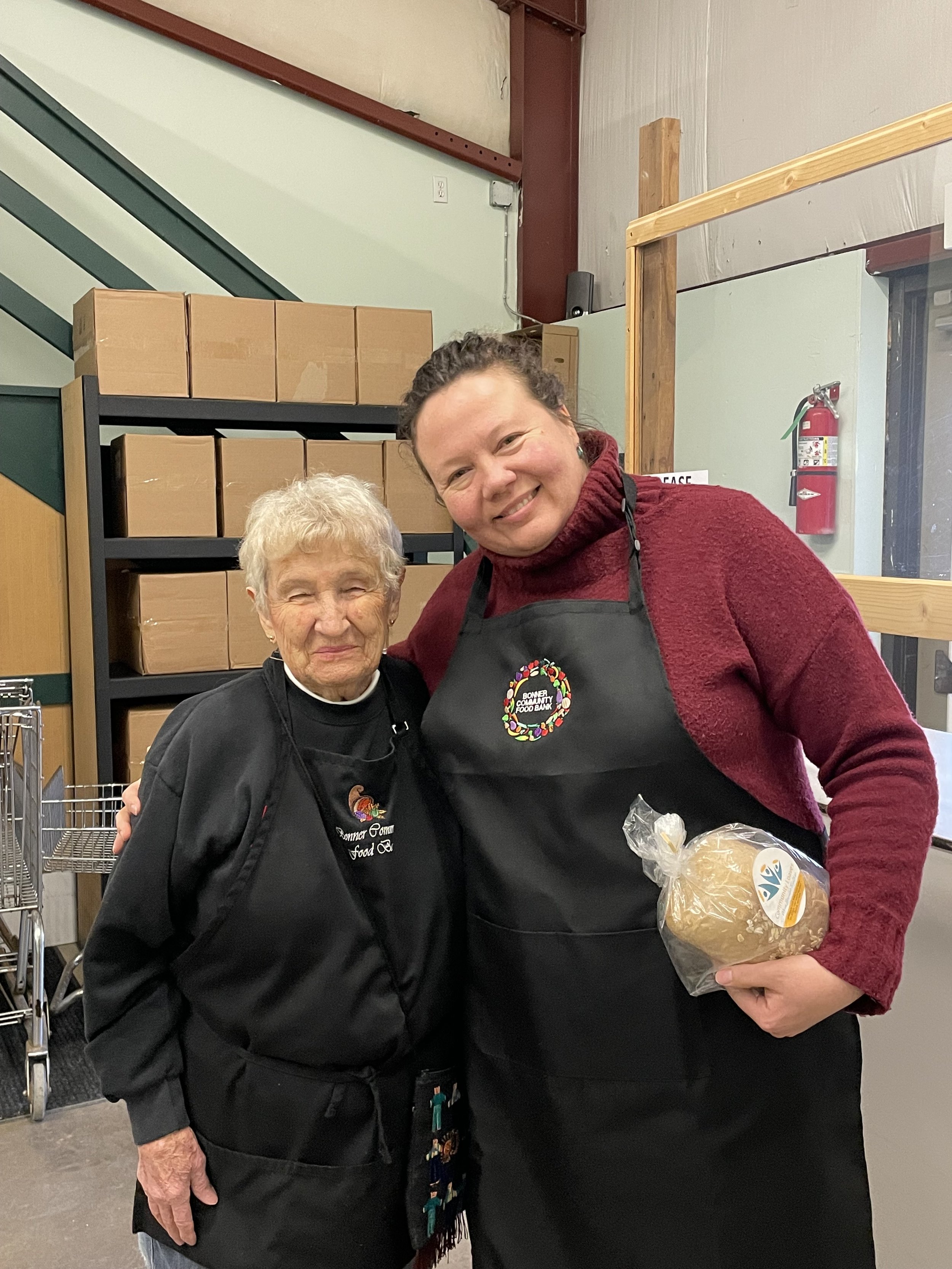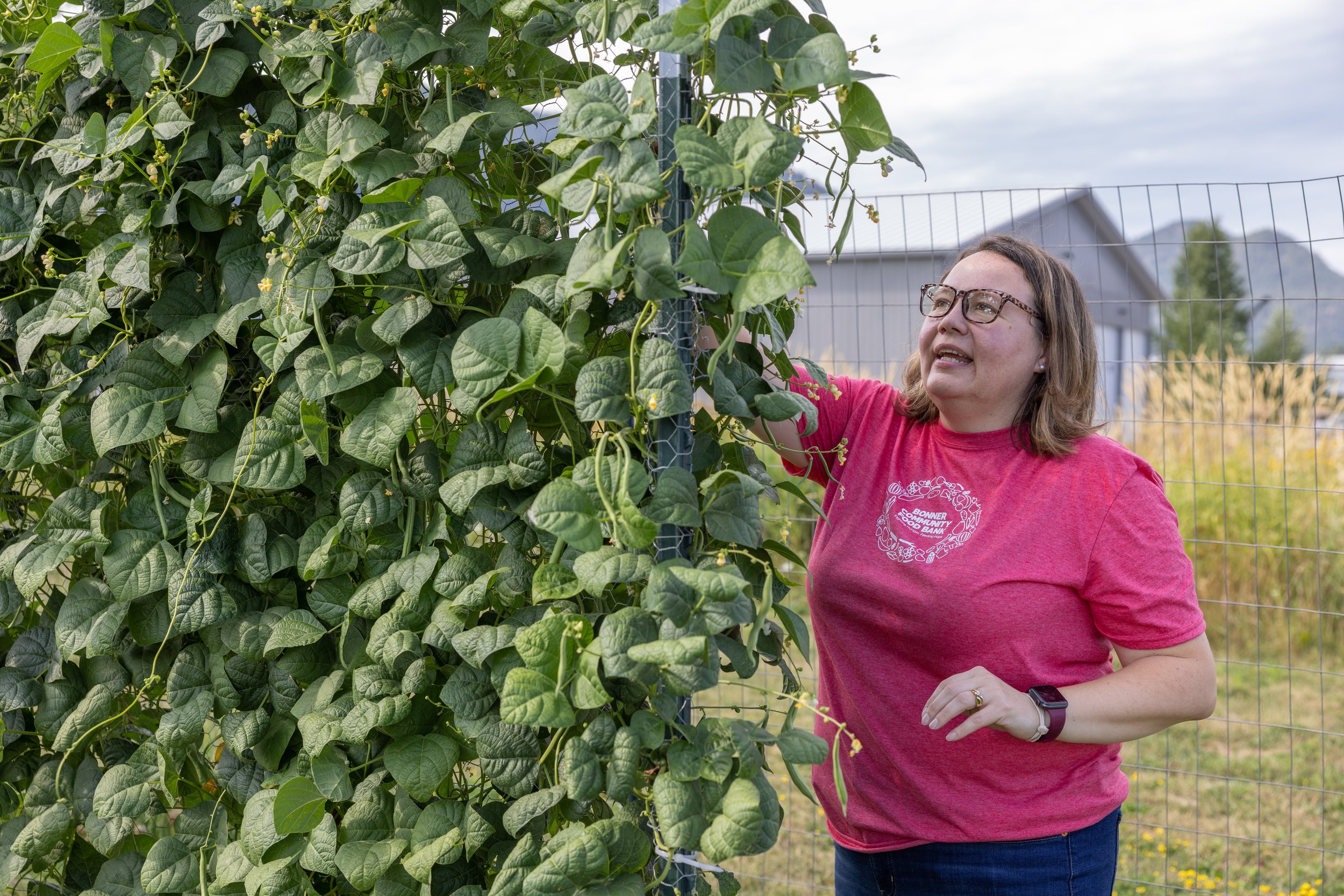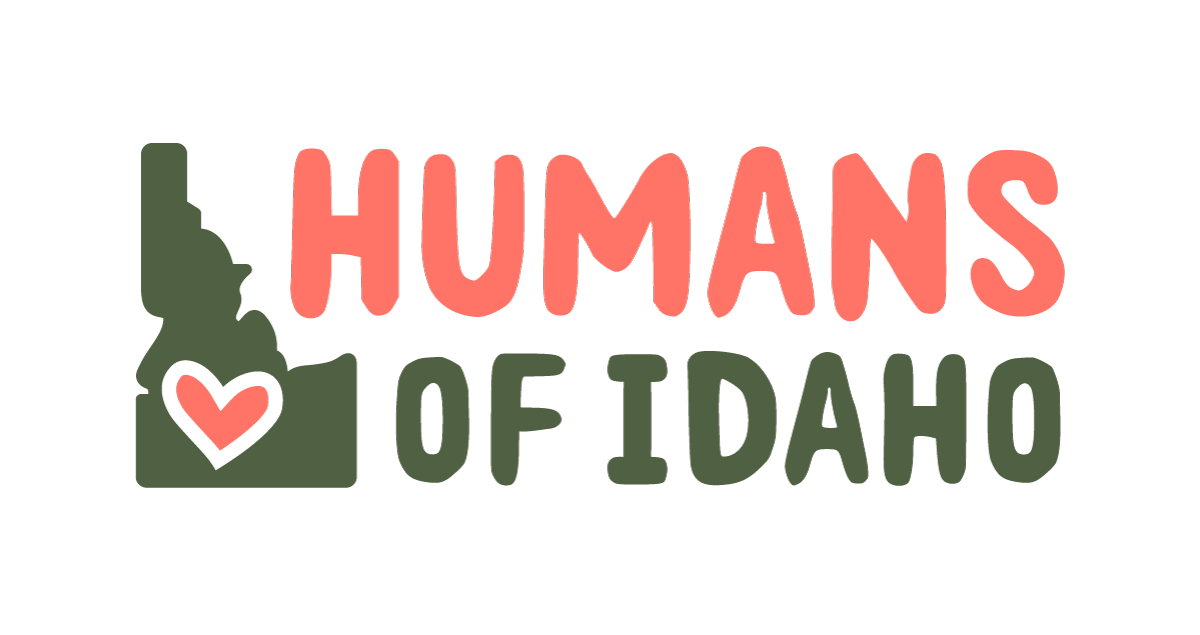Debbie Love
“I just knew that’s what I wanted to do…I’m meant to help people.”
--- Debbie Love, Executive Director, Bonner Community Food Bank
Hunger is an issue many of us consider historical, that is, a social issue that affected lives centuries ago. “Food, Glorious Food,” the song featured in the Broadway musical rendition of Charles Dickens’ novel Oliver Twist, calls attention to hunger and the plight of the working poor in London in the mid-1800s. Debbie Love, Executive Director of the Bonner Community Food Bank, can verify that hunger is as much a problem in North Idaho today as it was in London in the 19th century.
Imbued with gifts of compassionate insight and practical skills, Debbie, who has served as Executive Director of the Bonner Community Food Bank since 2016, is our featured Human of Idaho as we enter the holiday season. She has devoted her career and professional life to care and support of others and to various nonprofit organizations.
Born and raised in Boise, Debbie grew up in a family that valued outdoor activities, including hiking, hunting, fishing and farm work. As a child, she and her brothers spent summers milking goats and feeding cows at their aunt and uncle’s farm in Emmett, the hometown of current Idaho Governor Brad Little. Her family also instilled in her the value of service to others.
“My grandparents really influenced me as a kid,” Debbie says. “I think having that older generation and growing up [with their values] gave me a different perspective and outlook on helping people and really being there for others.” With her grandmother working with elders as a nurse, Debbie spent time as a child after school at the Treasure Valley Manor, where she helped the residents “wrap their little pets,” which were actually stuffed animals. Perhaps predictive of her life’s course, Debbie says “Those little caregiving things were very inspirational to me as a child.”
That sentiment permeated Debbie’s activities in high school and particularly in college. She graduated from Boise High School and Boise State University. As a student at BSU, Debbie got involved with the Agency for New Americans, a social services organization in Boise that helps refugees achieve self-sufficiency in their new lives by providing support and education. Debbie and other volunteers worked with the City of Boise in supporting newly arrived refugees from Somalia.
She and another volunteer “adopted” a Bosnian family, visited their apartment, and showed them how to use the Treasure Valley public transportation system. They also brought food and other supplies, which Debbie says---despite their language barriers, and foretelling of Debbie’s future in Bonner County—“Food brought us together.”
“I just knew that’s what I wanted to do” Debbie says of these experiences. “I’m meant to help people.”
Make a donation.
Donate Today -- Debbie Love --
Donate Today -- Debbie Love --
100% of donations raised for Debbie will go directly to the Bonner Community Food Bank in the form of a grant! Debbie will use the grant to provide food and address food stability issues in Bonner County. Check back to see the outcome of your donation.
Humans of Idaho raises funds for Idahoans to accomplish professional goals or personal missions. 100% of your donation goes to the featured Idahoan. And your donation is tax deductible.
The Path to North Idaho
“We’ve had the opportunity to travel, and I always return
to Idaho. There is something about the clean water, mountains,
and beauty that I do not take for granted.”
Debbie met her husband Will, a Sandpoint native whom Debbie describes as like-minded, while both were students at Boise State University. They remained in the Boise area a short time after graduation but eventually felt the pull north. Like many South Idahoans, Debbie had never been north of Moscow before she met and married Will.
After Will was hired as a general assignment and sports reporter at the Newport Miner newspaper in Newport, Wash., they moved to Spokane, where Debbie worked for the YWCA and houseless education. Both Debbie and Will “wanted to be back in Idaho,” and Debbie missed her family, so they moved back to Boise. Debbie was able to care for her ill grandfather while Will went to work as sportswriter for the Idaho Press Tribune. She eventually started working with the Girl Scouts of Silver Sage Council, traveling throughout Southern Idaho.
Eventually, a teaching position opened up for Will at his alma mater, Sandpoint High School. This opportunity drew the couple north again, enabling them to settle in Sandpoint. Debbie was able to transfer to a position with the Girl Scouts, based in Spokane, and covering a region that extended to the Okanogan Valley in Washington. She was also provided with an office in Sandpoint to do desk work whenever she wasn’t traveling.
In 2013, Debbie was hired by the Pend Oreille Arts Council (POAC) as its executive director. She worked for POAC for nearly three years until she was recruited by the Bonner Community Food Bank. Reflecting the close-knit Sandpoint community, two individuals connected with the facility nudged her in the direction of the Food Bank, and as noted, Debbie became Executive Director.
Although she had focused on service and the needs of others most of her life, Debbie’s eyes were opened even wider by the plight of the hungry, houseless and many families lacking basic necessities in Bonner County. Debbie says people are generally surprised when she speaks about Bonner County’s houseless population because the community’s homeless are mostly invisible, unlike major metropolitan areas where the houseless often congregate in particular locations.
“I remember being at a meeting and someone asked me, “We have a homeless population here?’…and I said, ‘Well, let me tell you, actually, we do.’” Debbie notes that in the summer, the houseless in Bonner County often live in campgrounds or out of cars. Some without homes are fortunate to be able to couch surf with friends or relatives or to live on their property. Debbie estimates that the Food Bank serves approximately 300 people per month who are houseless.
The Food Bank also serves many people who, although not considered houseless, struggle financially, are well below the federal poverty line, or who are confronted with unexpected crises, such as death of a loved one. With the help of as many as 30 to 45 volunteers at any one time, and with Debbie’s ingenuity and unrelenting persistence, the Food Bank strives to keep its shelves stocked with a variety of foods, not just dried beans.
Several local residents donate fresh produce directly from their gardens. Local merchants donate food. With Debbie’s leadership, volunteers also help keep the premises modern, clean, and inviting. The Food Bank strives to make customers feel welcome, to avoid any shame or stigma associated with needing help.


Everyone Needs Help from Time to Time
“If you give help, you need to learn how to accept it…
it’s a cycle of giving and receiving that’s happening, and it’s wonderful.”
As Debbie notes, “everyone needs help” at one point or another throughout their lives. She recalls interacting with a client who was overwhelmed. Her father had passed away shortly after she lost her job. She didn’t have funds to pay for the funeral and had to choose between food for her family or the funeral.
Upon learning her plight, Debbie was able to share with the woman that she and Will had experienced a house fire in 2020, leaving them essentially homeless for 10 months. Debbie told the client that they “didn’t want to accept help…[they] were prideful,” but they adhered to the advice of one of their friends, who reminded her that “If you give help, you need to learn how to accept it.”
In addition to providing the woman and her family with food, the Food Bank connected her to other resources, such as helping with school supplies and clothing for her children. Staff members also checked in on her and her family regularly to ensure they were safe and doing okay. The family is now back on their feet, and the woman is now a regular contributor to the Food Bank, both with food and money.
“I remember her handing me a $50-dollar bill and saying, ‘I know it’s not much, but it gives me satisfaction,” Debbie recalled, adding that “I feel like there is always the chance to payback . . . people are giving, and then receiving and giving. It’s a cycle of giving and receiving that’s happening, and it’s wonderful.”
The dignity the Bonner Community Food Bank extends to its customers, no doubt, results from its adoption of the Customers Choice model where customers can shop for what they choose rather than being provided boxes or bags of food. The idea is to give the customer responsibility and ownership of the process.
Debbie credits her predecessor for initiating the model after visiting a food bank outside of Seattle, but she has nurtured that model to the point that other food banks are adopting the same program, including those in Post Falls, and more recently, in Coeur d’Alene. In fact, a woman who works for a food bank in Juneau, Alaska, recently visited the Food Bank in Sandpoint, taking photos and learning about its Customer Choice process to share with her Alaska colleagues.
Debbie has also received calls from food banks in Michigan and other states inquiring about Bonner County’s Customer Choice model. As is her nature, Debbie is the first to give credit to the Food Bank Board, volunteers, and employees, but the Food Bank’s successful adaptation of the Customer Choice model is due in no small part to her effort.
Make a donation.
100% of donations raised for Debbie will go directly to the Bonner Community Food Bank in the form of a grant! Debbie will use the grant to provide food and address food stability issues in Bonner County. Check back to see the outcome of your donation.
Humans of Idaho raises funds for Idahoans to accomplish professional goals or personal missions. 100% of your donation goes to the featured Idahoan. And your donation is tax deductible.
Navigating Non-Profits Through Thick and Thin
“I’ve learned so much working in non-profits . . .
If we see a need, we’ll make it happen. Making a positive impact is key.”
Directors of non-profit corporations exercise unique skills in their endeavors to seek funding while providing services, of which creativity is foremost. Debbie Love is no exception.
“[It’s] what I love about it,” she says, “We can be creative. You wear many hats. I’ve learned so much working in a non-profit. If we see a need, we’ll make it happen. Making a positive impact is key.”
The Bonner Community Food Bank is a 501(c)(3) organization, funded primarily through private donations and grants. It is a private and non-government organization, although it receives food commodoties from two federal programs. Founded in the early 1980s by Sandpoint resident Florence Carter and a group of citizens, the facility first operated out of the basement of the Bonner County Courthouse. It then moved to a storage shed, and later to a property on Fifth Avenue in Sandpoint near Serv-a-Burger. In 2011 it moved to its current location at 1707 Culvers Drive in Sandpoint, which the organization purchased and managed to pay off the mortgage in 2020.
The newer building location actually proved critical to navigate the turbulence caused by the Coronavirus (COVID) pandemic. COVID increased the Food Bank’s challenges to a whole new level of providing services to the community in the midst of pandemic protocols. The food bank lost about 90 percent of its volunteers, many of whom were at high risk because of age. In addition, they lost major sources of food. Debbie and the Food Bank staff had to restructure delivery of services to the outside of the building and were compelled to return to delivery of boxed food.
They operated outside their building almost a year before the Centers for Disease Control and Prevention (CDC) guidelines permitted them to return indoors. The staff also had to scramble for sources of food. Debbie remembers “a lot of sleepless nights, trying to research how to get to national distributors and food brokers,” and she found some success with brokers as far away as Ohio and Southern California.
She noted that the Bonner General Health Foundation was generous with its assistance, and the facility received support from local mayors. With the help of the CEO of the Idaho Food Bank, and former Idaho Senator Shawn Keough, they and others connected with Idaho Governor Brad Little about CARES Act funding.
Moving forward from Pandemic Challenges
“You can look at every community in Idaho and people step up
to the plate when there's a need--especially in small communities.”
Fortunately, these days, normalcy at the Food Bank in Sandpoint is almost restored. Averaging about 40 to 50 volunteers per month pre-Pandemic, the facility now averages 30 to 35 per month. All volunteers who came on during the Pandemic have stayed. The staff also implemented a food delivery program to senior citizens during the Pandemic, the Commodity Supplemental Food Program for seniors, which they’re continuing post-Pandemic.
Partnership with other agencies is the cornerstone of helping the underprivileged, and the Food Bank has engaged in effective partnerships before, during, and after the Pandemic. For example, it partners with the Better Together Animal Alliance and Panhandle Health District in providing support for human and animal welfare.
The Food Bank also partners with local churches to offer a community meal every day of the week. When the local school district was unable to offer the summer lunch program this year, the Food Bank partnered with Kaniksu Land Trust and Food for Our Children to make the program available. Over the course of 11 weeks, the collaborative effort provided more than 7,000 lunches to children.
“There is an unwritten rule of looking after each other.” Debbie says, “You can look at every community in Idaho and see that people step up to the plate when there's a need, especially in small communities.” In Sandpoint, the community Food Bank is currently undergoing a 1,500 square foot expansion, which hopefully will enable the facility to accommodate the continuing increase in need of Bonner County residents in crisis.
Debbie and her ‘best friend” Will have now been married for 21 years. They live on a farm north of Sandpoint where they can enjoy Kenny and Joe, their Border Collies, and their cat Pepper. Both plan to continue their work benefitting the Sandpoint community---Will, as a journalism teacher and coach and Debbie, as a passionate and much-admired servant of humanitarian needs.
Houseless populations will continue to exist in North Idaho, particularly as the region sees some of the fastest growth in the country. Through pandemics, population growth, winter storms, or whatever crisis arises, lifelong Idahoan Debbie Love walks the talk, always emphasizing, “When there's a need, people in Idaho step up and help. We’re a giving community and a giving state.”
Make a donation.
------------------------------------------------------------------------------------------------------------
One-hundred percent of contributions raised through Humans of Idaho during the holiday season will go directly to the Bonner Community Food Bank in honor of Debbie Love and her endless support of the Bonner County community.
Please donate today!
You can support Debbie Love and the humans who make up this beautiful state of Idaho by making a tax-deductible (Tax ID: 88-0703378) contribution via Venmo or Paypal. Or mail a check to: Humans of Idaho, P.O. Box 1634, Sandpoint, ID 83864, USA.






